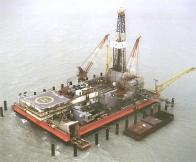 On Monday, the Moscow Times ran a story on one of the most watched projects in the Caspian region. Kashagan, an offshore oil project in the Kazakh sector of the Caspian Sea, is the largest oil field to have been discovered anywhere in the last 30 years, with an estimated 38 billion barrels of oil.
On Monday, the Moscow Times ran a story on one of the most watched projects in the Caspian region. Kashagan, an offshore oil project in the Kazakh sector of the Caspian Sea, is the largest oil field to have been discovered anywhere in the last 30 years, with an estimated 38 billion barrels of oil.
According to the article: “With oil prices about $50 higher than when Kashagan’s first well was drilled in 2000, Kazakhstan is no longer happy with a contract that gives it just 10 percent of the project’s revenue and an 8.33 percent stake in the field through its national oil firm, KazMunaiGaz.”
Most of the revenues from oil field are going the project’s major shareholders: “Project operator Eni holds an 18.52 percent stake in Kashagan, as do ExxonMobil, Shell and Total. ConocoPhillips owns 9.26 percent and Japan’s Inpex has 8.33 percent.”
“Last month, Kazakh Energy Minister, Baktykozha Izmukhambetov, said the government hoped to change the terms of its production-sharing agreement with the Eni-led consortium so that the state would receive 40 percent of the profits from the project.”
“Kashagan has already faced numerous delays. Its original start-up date of 2005 has been pushed back to the second half of 2010, and costs for the first phase of the project have doubled to $19 billion.”
The non-governmental organization (NGO), Crude Accountability, reports on a number of other problems with project:
Environmental concerns: The Kashagan oil field is located within a protected territory—the shallow nature reserve zone of the north Caspian Sea. Most notably, the endangered sturgeon migrate through this area to their spawning grounds, the Caspian Seal’s whelping grounds are found here, and numerous bird species migrate through this area.
Health concerns: Residents of Atyrau city and Atyrau region are at risk of toxic exposure from the development of the Kashagan field itself, as well as from the Bolashak Processing Plant, which is under construction approximately 30 kilometers from Atyrau. The plant will separate hydrogen sulfide and other sulfates from the highly sulfurous Kashagan oil, making it “ready” for transport to the west. The risk of exposure to hydrogen sulfide, which is known for its toxicity to humans, is highly concerning.
Social concerns: Kashagan not only threatens the environment, it also threatens the livelihoods of millions of residents of the Caspian region. Oil development in the north Caspian places the tourism and fishing industries at risk and prevents investment in other economic ventures that could contribute to the sustainability of the region.
Labor concerns: The majority of workers employed in the construction of the Bolashak Processing Plant are not local residents. Many of the brigade workers come in from other parts of Kazakhstan, from Russia or from abroad.
Crude Accountability has also recently reported that “Work on Kashagan May Be Halted According to the Minister of Environmental Protection.” According to an article posted on their website, “Development of the Kashagan Field may be halted due to violations of environmental protection legislation by the project operator—the Agip KCO consortium.” Click here to read the article on Crude Accountability’s webiste.
